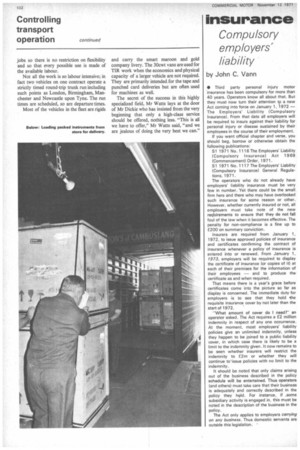insurance
Page 104

If you've noticed an error in this article please click here to report it so we can fix it.
Compulsory employers' liability
by John C. Vann
• Third party personal injury motor insurance has been compulsory for more than 40 years. Operators know all about that. But they must now turn their attention to a new Act coming into force on January 1, 1972 — The Employers Liability (Compulsory Insurance). From that date all employers will be required to insure against their liability for personal injury or disease sustained by their employees in the course of their employment.
If you want official chapter and verse, you should beg, borrow or otherwise obtain the following publications: Si 1971 No. 1116 The Employers' Liability (Compulsory Insurance) Act 1969 (Commencement) Order, 1971.
Si 1971 No. 1117 The Employers' Liability (Compulsory Insurance) General Regulations, 1971.
The operators who do not already have employers' liability insurance must be very few in number. Yet there could be the small firm here and there who may have overlooked such insurance for some reason or other. However, whether currently insured or not, all employers must take note of the new reqbirements to ensure that they do not fall foul of the law when it becomes effective. The penalty for non-compliance is a fine up to £200 on summary conviction.
Insurers are required from January 1, 1972, to issue approved policies of insurance and certificates confirming the contract of insurance whenever a policy of insurance is entered into or renewed. From January 1, 1973, employers will be required to display the certificate of insurance (or copies of it) at each of their premises for the information of their employees — and to produce the certificate as and when required.
That means there is a year's grace before certificates come into the picture so far as display is concerned. The immediate duty for employers is to see that they hold the requisite insurance cover by not later than the start of 1972.
"What amount of cover do I need?" an operator asked. The Act requires a £2 million indemnity in respect of any one occurrence. At the moment, most employers' liability policies give an unlimited indemnity, unless they happen to be joined to a public liability cover, in which case there is likely to be a limit to the indemnity given. It now remains to be seen whether insurers will restrict the indemnity to f2m or whether they will continue to'issue policies with no limit to the indemnity.
It should be noted that only claims arising out of the business described in the policy schedule will be entertained. Thus operators (and others) must take care that their business is adequately and correctly described in the policy they hold. For instance, if some subsidiary activity is engaged in, this must be noted in the description of the business in the policy.
The Act only applies to employers carrying on any business. Thus domestic servants are outside this legislation. '










































































































































































































